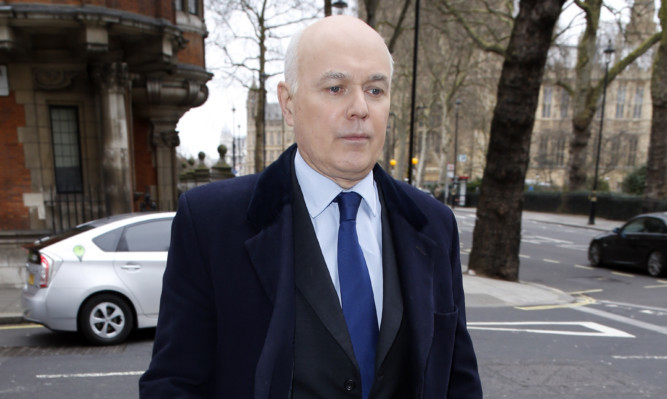All political lives end in failure.
If Enoch Powell’s dictum holds true then Iain Duncan Smith’s resignation letter spells double-barrelled trouble for David Cameron.
The self-styled “quiet man” turned up the volume spectacularly on Friday night with an Exocet missile aimed at the midships of the Tory Government.
And IDS scored a direct hit. When a Prime Minister is reduced to saying he is “puzzled” and “disappointed” by a resignation, you know he is in deep doodoo. When he then organises a junior minister to get torn into her former boss, you know the wounds are cutting deep.
Then when he launches a private “four-letter-word tirade” at the recalcitrant minister for insisting on resignation, you know full-scale civil war is well and truly under way.
However, the real Duncan Smith target was not the Prime Minister but the chancellor, George Osborne not the sheriff but the deputy.
The background is clear enough. A few weeks ago, in that backroom coven where the Tory wizards cook up their pernicious policies, they decided that the pain of Osborne’s missed economic targets had to be targeted on someone. And so they decided to cast their dastardly spell in the direction of disabled people by making thousands of pounds of their benefit money under the new personal independent payments simply disappear.
IDS “went along” with this unpleasant madness, just as he has swallowed everything else the Chancellor has forced down his throat over the last six years. His social security brief has taken by far the biggest hits from austerity. The policy was duly announced but then disability groups started to build up a head of outraged steam, mobilising the opposition and targeting some fretting Tory backbenchers.
Then Duncan Smith turned up at the pre-Budget Cabinet last Wednesday morning to find out a big tax cut was to be handed out to the top 15% of taxpayers and juxtaposed with the disability payments cuts. This meant it would be extraordinarily difficult to maintain the argument that there was no alternative to further disability cuts in a Budget which included rich people getting a hefty tax cut.
As the Budget went down badly, the Downing Street neighbours, Prime Minister and Chancellor, started to panic and rumours spread of a climbdown in the offing. Duncan Smith, the leading Eurosceptic in the Cabinet, was being lined up to take the rap and look like the pantomime villain into the bargain. Making the rich richer while disabled people are more disadvantaged is not a legacy any minister would want to have hanging around his neck.
Quite incredibly and totally ineptly, Labour at Westminster lined up to back the top pay tax cut, taking the political pressure momentarily off the Chancellor. But Duncan Smith saw the political trap being set for him and had had more than enough. His departure means the Prime Minister has lost the high moral ground on welfare cuts to Duncan Smith, the high priest of the “bedroom tax”, and that is intensely damaging. The IDS resignation letter is a masterpiece flinging back in the face of the Prime Minister the Chancellor’s favourite incantation that “we are all in this together”.
Some political resignations get quickly lost in the fog of politics and are soon forgotten. Others, like those of Geoffrey Howe and Michael Heseltine of bygone Tory generations, have a big impact because they come at a time of a political changing of the guard.
I’m betting that the departure of IDS is one of the latter. The poison pen in the letter from Duncan Smith is the issue of Europe. Out of the Cabinet, he is now free to campaign full square against the Prime Minister in the upcoming EU poll.
Furthermore, Tory backbenchers, who up until now have been held in line by the seeming inevitability of Osborne’s succession into the top job, are looking at a political landscape where the Chancellor’s stock is falling faster than the Chinese stock market. He has gone from cock of the walk to “unfit for office” with no intervening period whatsoever.
All of which spells big problems for the Prime Minister. The European referendum campaign is not going at all well. Even Jeremy Corbyn’s Labour has managed to draw level in the English polls, while Boris Johnson is swimming around the body politic like a giant shark waiting for the blood to be spilled in the water.
If the Euro referendum is won, which is still the most likely outcome, Cameron will hand over a deeply divided and fractious party which will probably elect a Eurosceptic as his successor. If it is lost then he will be packing up his bags by the autumn.
There are no glad, confident mornings left for Cameron and for the Tories the party is almost over.
